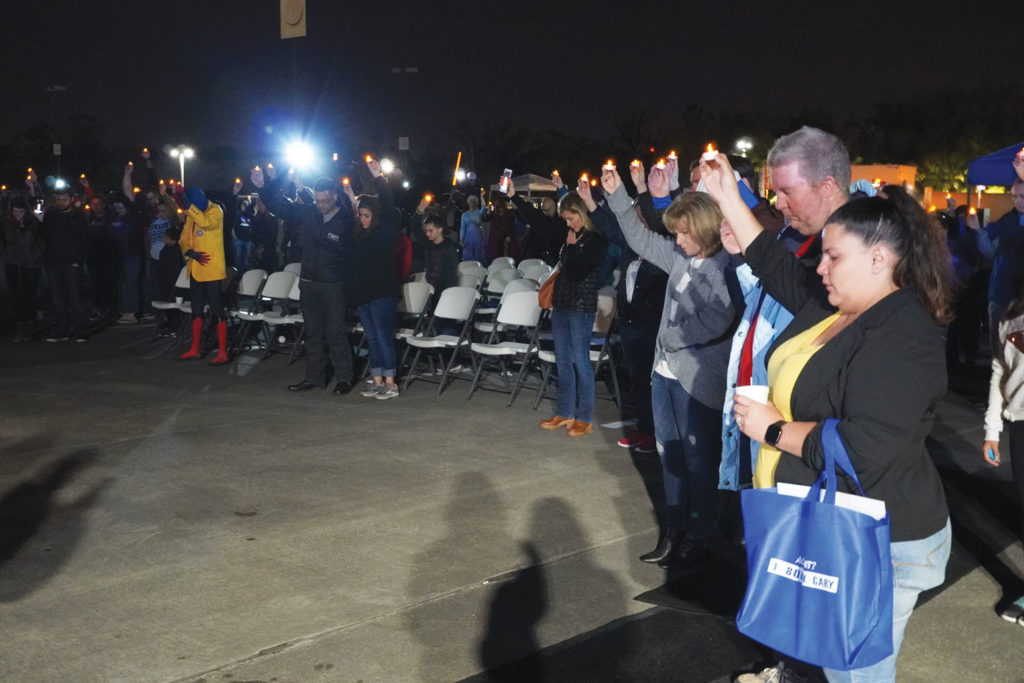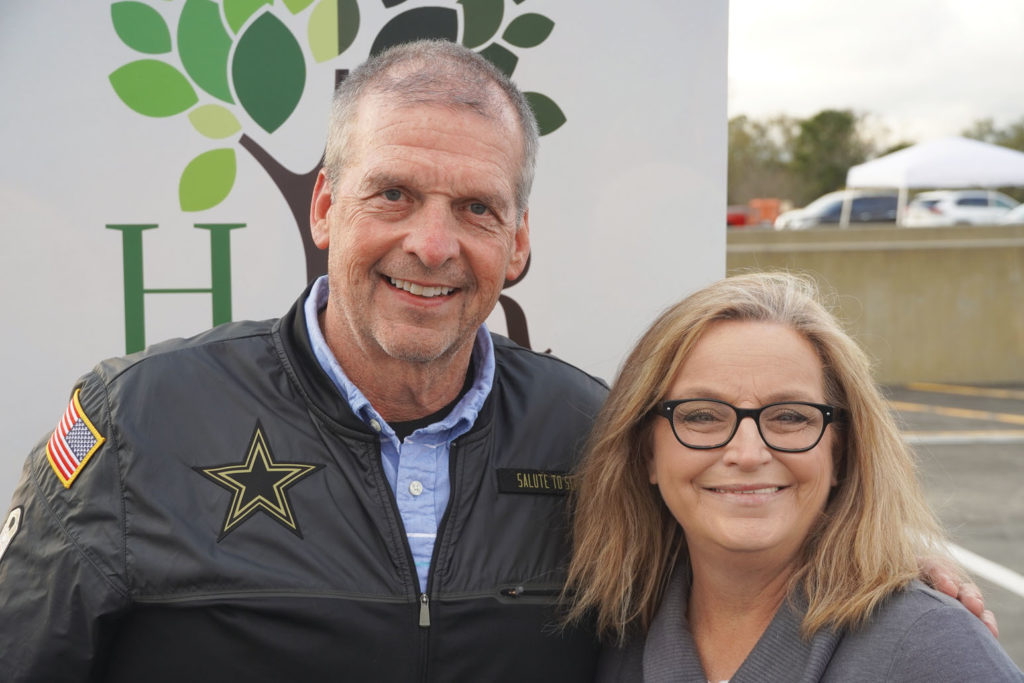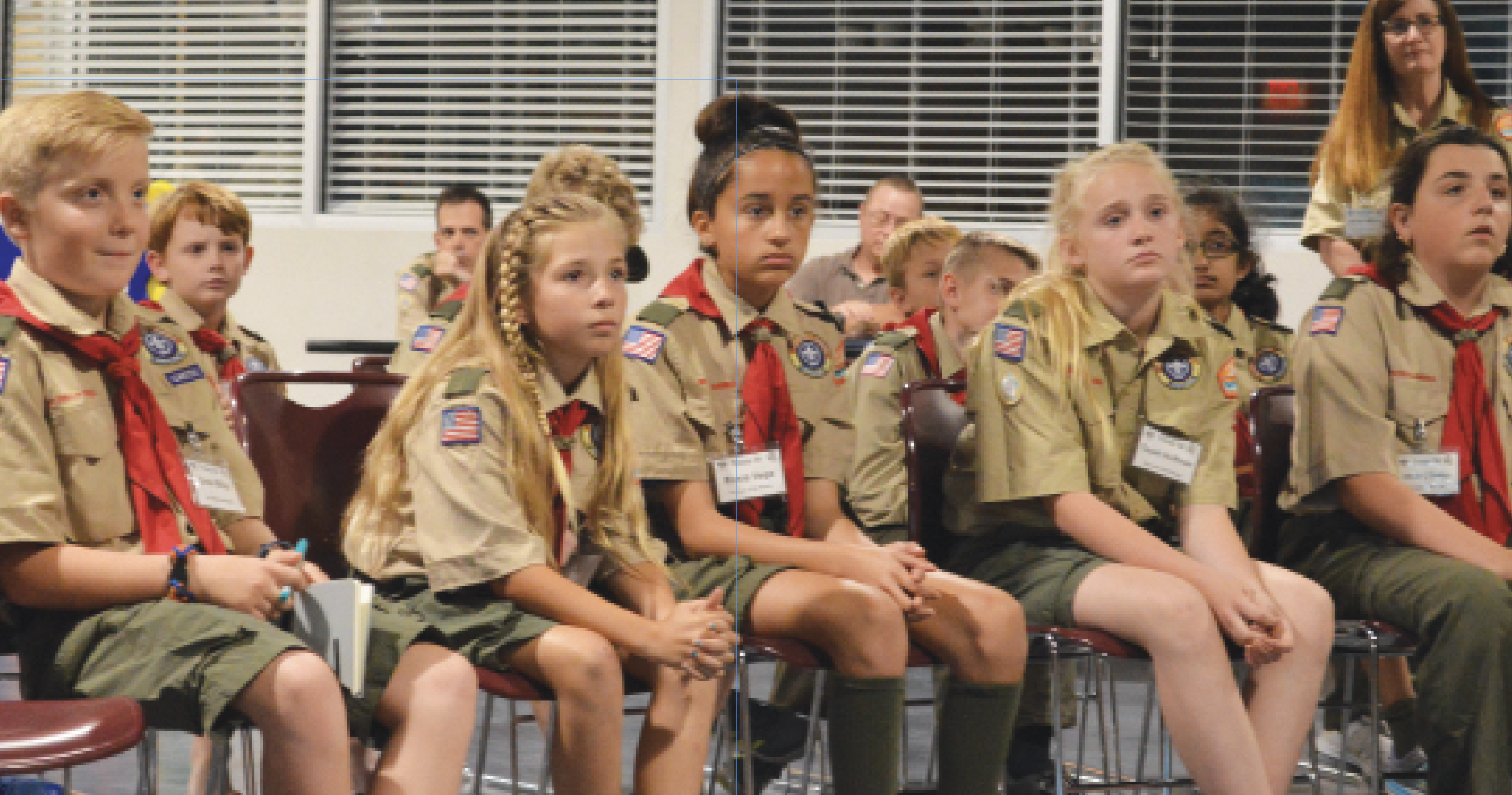
It seemed fitting that a classic Florida sunset — vibrant slashes of pink, purple and orange — marked the beginning of Light Up The Night, an annual event created to raise education and awareness about human trafficking,
The free event, held right around sunset on Feb. 1 on the upper level parking garage at The Shops at Wiregrass by the Pasco County-based Human Trafficking Foundation (HTF), featured musical performances, local vendors, refreshments, activities for children and teenagers, and the Pasco Sheriff’s Mounted Posse on horseback.
Also appearing were survivors of human trafficking, including Edie Rhea, who told those in attendance that she was sexually abused and trafficked from age 8-17 by her mother’s boyfriend, after he convinced her mother to move to Tampa from their hometown of Baltimore, MD.
“Moving us was very smart on his part, because it got us completely away from all our friends and family,” said Rhea, 51, who now lives in North Tampa and serves as Executive Director of Healing Root Ministry, a faith-based nonprofit that assists female trafficking victims over the age of 18 with housing, life skills training and obtaining GEDs.
Rhea, who at age 12 was impregnated and then forced into having an abortion by a man who had purchased her, found herself on the street at 17 with no education or basic skills after her mother had kicked out her and her trafficker.
She met up with a man named David, who used to buy drugs from her mother, and the two began a relationship.
Today, 34 years later, they are happily married with five children, three adults and two under the age of ten they recently adopted.
“When we were first married, I had lots of affairs, because I really believed that every time a man spoke to me, I had to have sex with him,” said Rhea.
A few years ago, Rhea met up with her former trafficker. They prayed together and she said she forgave him. Weeks later, he passed away, and the experience inspired Rhea to form Healing Root Ministry, a 501(c)(3) non-profit, faith-based organization that provides shelter for those who were once enslaved, as well as “hope, help and healing,” according to its mission statement.H
Several organizations, including Healing Root, received beneficiary funds from HTF at the event.
“The whole idea of Light Up The Night was simply that this is such a dark crime,” said Cpl. Alan Wilkett, HTF chairman and commander of the Pasco County Human Trafficking Task Force.
“This criminal activity is probably the darkest crime that I’ve ever investigated,” said Wilkett, 58, who has been in law enforcement for 27 years, “and I’ve had the opportunity to investigate just about everything you can imagine.”
Wilkett described human trafficking as a “relatively young crime,” pointing out that there was no official charge against it for victims like Rhea until the year 2000, when Congress passed the Trafficking Victims Protection Act.
“Some of the cases we’ve seen over the years, and especially having children myself, have been very impactful on me,” Cpl. Wilkett said. “It’s a broad, encompassing crime that directly affects the fabric of who we are.”

Indeed, said both Wilkett and Rhea, human trafficking is a much more widespread issue today then ever before.
According to HTF, it is the second-largest criminal enterprise in the world, behind drug trafficking, with an estimated 40.3 million current victims worldwide.
Between 15,000-18,000 are trafficked annually into the U.S. alone, and Florida currently ranks third in the nation for calls to the National Human Trafficking Hotline.
The Tampa Bay area, says the foundation, is usually in the top three cities in the state for trafficking.
In 2017, Pasco County became the first “Trafficking-Free Zone” in the country. This distinction, given by the U.S. Institute Against Human Trafficking, intends to send a message to traffickers that they are being watched, thereby reducing the demand for their victims.
“A lot of people believe that this only happens overseas, but it’s also happening here, now, in our own backyard,” said Rhea, who spends 65 hours every week running Healing Root pro-bono.
Even as the temperature dropped into the low 50s with chilly winds at the event at the Shops, attendees talked with vendors, pledged donations, and enjoyed hot cocoa, popcorn and cotton candy to the backdrop of performances from the Northwest Community Church band and Vessels 360, a Christian-based dance team from Hernando High.
Vessels 360 performed a visceral interpretation of human trafficking, prompting tears from many in the audience, before Cpl. Wilkett handed out checks ranging from $2,000-$5,000 to various organizations who help trafficking victims.
The evening came to a close with a candlelight vigil (photo on previous page) led by Cpl. Wilkett, honoring survivors and offering prayers for current victims. Those without their own battery-operated votive candles thrust their phones in the air, having downloaded candle apps for the occasion.
“”The strongest thing you can do against hate is bring love,” said Cpl. Wilkett as attendees circled the stage. “And the strongest thing you can do against darkness is bring in the light.”
For more information about Light Up The Night or to donate or volunteer, go to HTFoundation.us. For more information about Healing Root Ministry, go to HealingMinistry.com. If you suspect human trafficking or are or have been a victim yourself, please call the National Human Trafficking Hotline at (888) 373-7888.













